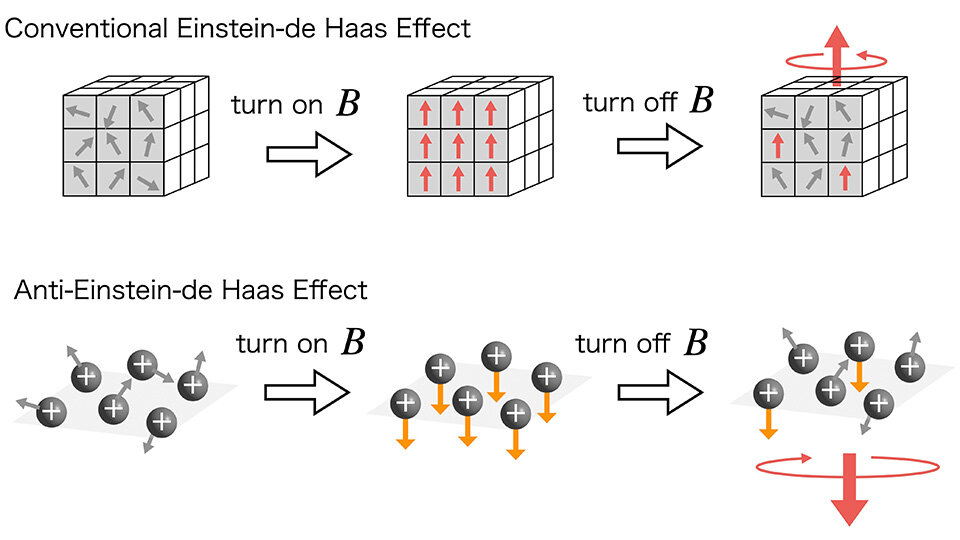2025.07.02 Wednesday
Strong Magnetic Fields Flip Angular Momentum Dynamics in Magnetovortical Matter
Study shows orbital angular momentum can outweigh spin in strong magnetic fields, reshaping our view of magnetized quantum systems

Angular momentum is a fundamental quantity in physics that describes the rotational motion of objects. In quantum physics, it encompasses both the intrinsic spin of particles and their orbital motion around a point. These properties are essential for understanding a wide range of systems, from atoms and molecules to complex materials and high-energy particle interactions.
When a magnetic field is applied to a quantum system, particle spins typically align with or against the field. This well-known effect, known as spin polarization, leads to observable phenomena such as magnetization. Until now, it was widely believed that spin played the dominant role in how particles respond to magnetic fields. However, new research challenges this long-held view.
In this vein, Assistant Professor Kazuya Mameda of Tokyo University of Science, Japan, in collaboration with Professor Kenji Fukushima of School of Science, The University of Tokyo and Dr. Koichi Hattori of Zhejiang University, found that under strong magnetic fields, the orbital motion of magnetovortical matter becomes more significant than spin effects, leading to reversing the overall direction of angular momentum. The study will be published in Physical Review Letters on July 01, 2025.
"It was previously believed that most microscopic phenomena in a magnetic field were governed by spin angular momentum—a physical quantity characterizing the intrinsic rotational motion of microscopic particles," explains Dr. Mameda. "However, this study found that in a strong magnetic field, orbital motion can overwhelm spin effects, reversing the direction of rotational motion from what was previously believed."
The researchers studied fermionic systems—specifically Dirac fermions— subjected to both strong magnetic fields and rotation. By ensuring gauge invariance and thermodynamic stability in their theoretical framework, they demonstrated that orbital contributions to bulk properties can exceed spin contributions.
Unlike spin, which aligns with the magnetic field, the orbital angular momentum aligns according to Lenz's law—opposite to the direction of the magnetic field. As the magnetic field intensifies, the charge density from the orbital-rotation coupling and orbital angular momentum grow twice the magnitude of their spin counterparts, but with opposite sign.
This reversal in total angular momentum reshapes our understanding of magnetovortical matter and links its behavior to a broader class of quantum effects known as anomaly-induced transports. The findings also pave the way for simulations using lattice QCD—a powerful computational tool for studying strongly interacting particles such as quarks and gluons under extreme conditions.
The discovery that a strong magnetic field can reverse angular momentum in quantum systems challenges established theories. It highlights the previously underestimated role of orbital motion, showing it to be more influential than spin in certain regimes. This insight could spark advances in groundbreaking technologies, particularly in orbitronics, a field dedicated to manipulating the orbital motion of electrons.
"Total angular momentum reversal under strong magnetic fields has been overlooked across fields from materials science to astrophysics. Our findings redefine the foundational physics of modern physics and point to new frontiers in orbitronics—where controlling electron orbital motion could lead to innovative device applications," concludes Dr. Mameda.

Image title: Spin versus orbital polarization under an external rotation field with varying magnetic field strength
Image caption: (a) In a weak magnetic field, broad cyclotron orbits suppress the orbital contribution, allowing spin polarization to dominate, (b) In strong magnetic fields, tight cyclotron orbits enhance orbital polarization, which overtakes the spin effect and can reverse the overall direction of the angular momentum.
Image credit: Kazuya Mameda from Tokyo University of Science, Japan
Image source link:
Image license: Original content
Usage restrictions: Cannot be used without permission
Reference
| Title of original paper | : | Preponderant Orbital Polarization in Relativistic Magnetovortical Matter |
| Journal | : | Physical Review Letters |
| DOI | : | 10.1103/PhysRevLett.135.011601 |
| Authors | : | Kenji Fukushima1, Koichi Hattori2,3, and Kazuya Mameda4,5 |
| Affiliations | : |
1Department of Physics, The University of Tokyo 2Zhejiang Institute of Modern Physics, Department of Physics, Zhejiang University 3Research Center for Nuclear Physics, Osaka University 4Department of Physics, Tokyo University of Science 5RIKEN iTHEMS, RIKEN |
About The Tokyo University of Science
Tokyo University of Science (TUS) is a well-known and respected university, and the largest science-specialized private research university in Japan, with four campuses in central Tokyo and its suburbs and in Hokkaido. Established in 1881, the university has continually contributed to Japan's development in science through inculcating the love for science in researchers, technicians, and educators.
With a mission of "Creating science and technology for the harmonious development of nature, human beings, and society," TUS has undertaken a wide range of research from basic to applied science. TUS has embraced a multidisciplinary approach to research and undertaken intensive study in some of today's most vital fields. TUS is a meritocracy where the best in science is recognized and nurtured. It is the only private university in Japan that has produced a Nobel Prize winner and the only private university in Asia to produce Nobel Prize winners within the natural sciences field.
■
Tokyo University of Science(About TUS)

About Assistant Professor Kazuya Mameda
from Tokyo University of Science, Japan
Funding information
This work is supported by the Japan Society for the Promotion of Science KAKENHI Grant Nos. 20K03948, 22H01216, 22H05118, and 24K17052.

